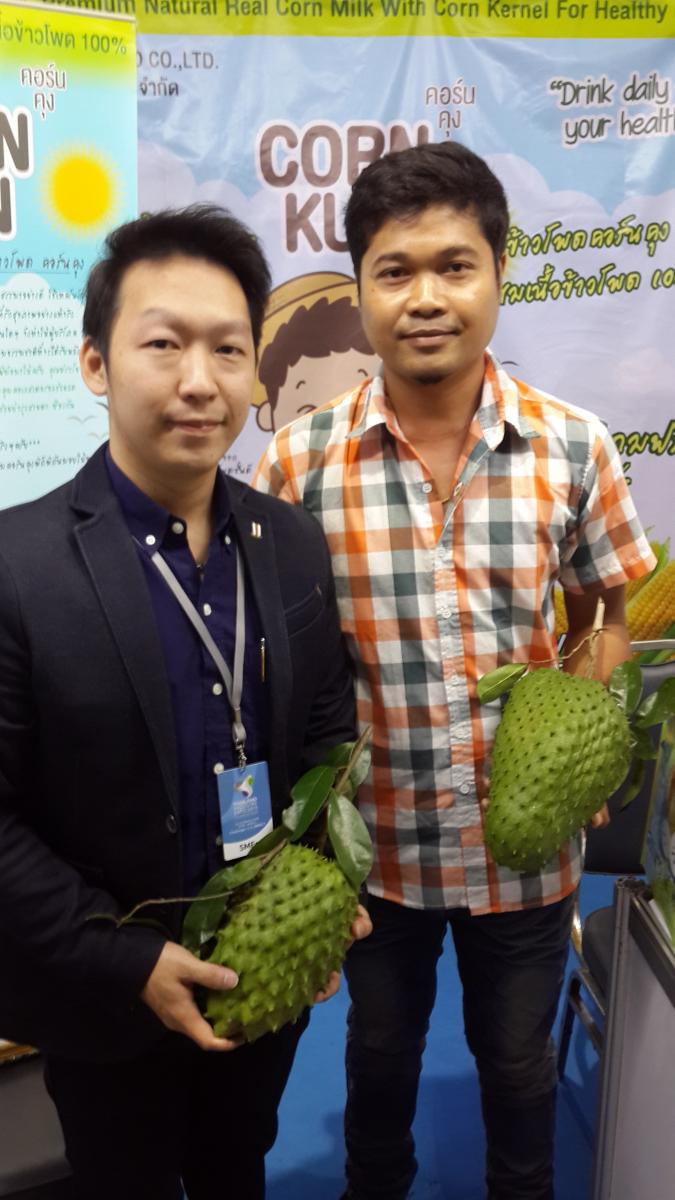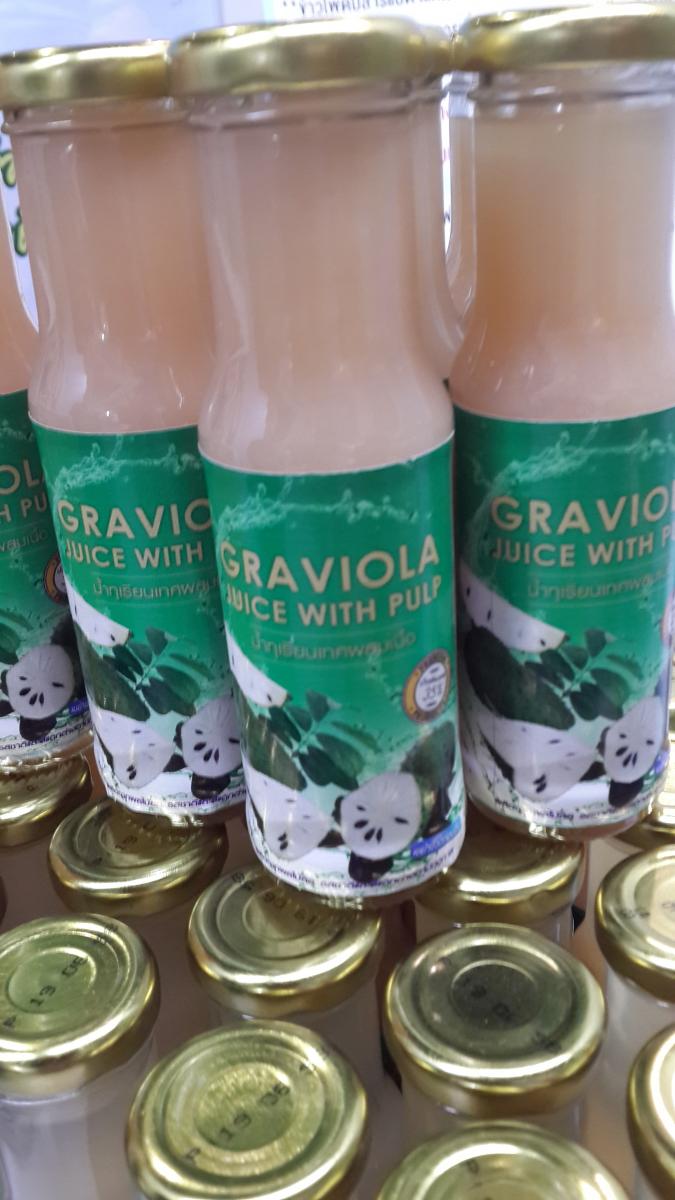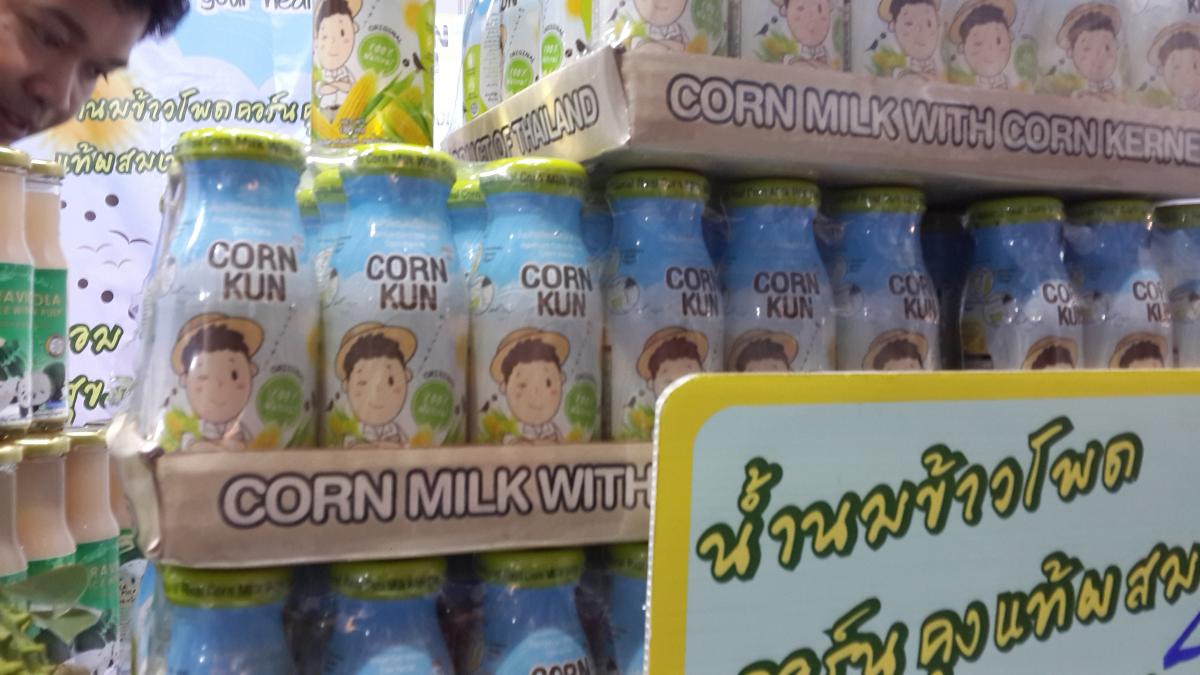THE marketing term “superfruit” is used to describe a fruit believed to have great health benefits, usually because of its high levels of antioxidants. As there are no scientific criteria to assess these benefits, it is up to the manufacturer to provide the proof.
As luck would have it, five years ago Suwicha Ninsang started a farm selling soursop trees, also known as graviola, in Chumphon province in southern Thailand. He met a man who had studied antioxidant research on the internet, and through conversations with him Mr Suwicha was able to convince Mahidol University to conduct studies on the health benefits of soursop.
The university found the fruit has acetogenins, which help eliminate certain kinds of bacteria and are high in antioxidants. It also claimed the chemical compound annonacin found in soursop helped inhibit the symptoms of Parkinson’s disease.
These studies got Mr Suwicha thinking he should try to commercialize soursop juice, as it has more value than selling the trees. He agreed to a start-up business with Royal Food Production Company Ltd.
Royal Food started producing its soursop juice in Thailand in 2014, but most of its customers are from abroad.
“The Thai market still requires a lot more education and marketing, as many Thais are still unfamiliar with soursop, let alone its health benefits,” shared Akararuck Taechangam, executive sales director for the company. “We focus on sales to South Korea now as soursop and its health benefits are extremely well-known there. In fact, it is so popular in South Korea, people fly here just to buy fresh soursop and take it home with them, as they cannot grow the fruit there because of the climate.”

Akararuck Taechangam (left), executive sales director of Royal Food Production Company Ltd and partner in producing soursop products, Suwicha Ninsang
“The Catholic University of Korea conducted a study that found soursop had many cancer-fighting properties. China is also a big market for soursop juice.
“The Thai name for soursop is durian thet, which is probably because the fruit has some spikes on the outside, much like our famous durian, often called the king of fruits. But the neither the taste nor the nutrition of the soursop is similar to durian, and many Thais have never eaten soursop, so part of our job is to educate the Thai market.

Graviola (soursop) juice with pulp from Royal Food Production Company Ltd
“But Thailand does have a tradition of seeking natural remedies from foods and beverages. For example the Chinese orange mushroom called tang chao is highly sought after, mainly because men believe it can help them with erectile dysfunction. One kilogram can cost over 100,000 baht.”
It is important to note there still has not been a single peer-reviewed medical study that found soursop fruit had an effect on cancer cells.
Despite this, Mr Akararuck sees lots of opportunities throughout Southeast Asia.
“Malaysia sells a different type of soursop in a tin can, but it is not 100 percent natural,” he said. “As people find out about the health benefits of soursop juice, we are optimistic about growing our business in ASEAN, especially as several of these countries have ageing populations.”
Thailand’s superfruit juice market is in its initial stages, said Mr Akararuck.
“A lot of what you see now is mangosteen juice, and we are working on developing that too. Our company is also working on a durian juice solely for export, as well as a coconut product we expect to introduce next year. We’ve had a good response with several of our products in China and Australia. The US has the potential to be a huge market for our superfruit juices, but it has many complex laws and it updates regulations all the time and we don’t have the facilities to keep up with them.
“We’re going to lots of trade fairs overseas this year. When we go overseas, we like to look for a local partner to help us ease our transition into a market. Royal Food has prepared a label in English specifically for our export purposes.”
Though the Federation of Thai Industries does not measure superfruit juice sales, Euromonitor International reports that juice drinks in Thailand enjoyed growth of 6 percent last year to 14.1 billion baht. A key differentiation point for market leader Minute Maid was use of real pulp, and Royal Food is hoping this trend catches on with its juices.
Its soursop juice has real pulp in it, and the company is also marketing Corn Kun, a “corn milk” drink with real corn kernels in the beverage.
One reason why soursop took so long to catch on in Thailand is it has a short shelf life. It has to be picked when it is still hard and unripe, then it will ripen in two or three days. The soursop must be processed quickly or it will rot, including removing 100 or more black seeds from a three-kilogram fruit.
Another reason is Thailand was never colonized, meaning no great power took it upon itself to bring the fruit to the country.
Soursop tea
Royal Food also sells a tea made from the leaves of the soursop tree. The company sells a 150 milliliter bottle of soursop juice for 65 baht, while a 180-ml bottle of Corn Kun costs 25 baht.

Corn milk with the added benefit of fiber from kernels
Corn juice with kernels
The company is also marketing Corn Kun, a “corn milk” drink with real corn kernels in the beverage.
“We added the kernels for the texture and fiber,” said Mr Akararuck. “We gave it a Japanese name because people here have a good association with products from that country. It is 100 percent natural and very low in sugar. Cornell University in the US released a study where it found cooking sweet corn actually boosts the crop’s ability to fight cancer and heart disease because it frees up healthful compounds. Unlike most foods, the longer you cook corn, the healthier it becomes. The amount of ferulic acid increases by 240 percent to 900 percent as you cook the corn from 10 minutes to 50 minutes.
“We feel these can all be key selling points as consumers are more concerned with their health these days. People believe if they eat healthier, they don’t need to go to the doctor as often.
“Corn has lots of lutein and zeaxanthin, both of which are very good for eyesight. And the soursop juice has 66 kilocalories per 100 grams, so it is quite high in energy. Ferulic acid helps keep your skin healthy and can fight heart problems and Alzheimer’s disease. The fiber in the Corn Kun is also good for digestion,” he said.
Lebron James Shoes














